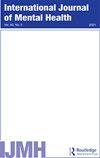后苏联乌克兰的心理健康服务寻求行为
IF 1.7
Q3 PSYCHOLOGY, CLINICAL
引用次数: 1
摘要
摘要随着乌克兰医疗保健系统的改革,那些需要心理健康治疗的人仍然存在严重的治疗差距。这项研究扩展了对寻求治疗行为背后因素的有限了解。我们试图理解:是什么鼓励或阻止乌克兰人寻求心理健康治疗?此外,在那些选择寻求治疗的人中,是什么影响了所寻求的治疗类型(传统或替代)?替代治疗被定义为由精神顾问或治疗师提供的治疗或咨询,传统治疗被定义为由心理健康专业人员或其他健康专业人员提供的正式治疗或咨询。这项研究使用了2002年乌克兰版的《世界心理健康综合国际诊断访谈》——这是前苏联国家唯一可用的此类数据集——探索了心理健康服务寻求治疗行为的预测因素。结果表明,被诊断为抑郁、焦虑或药物使用相关障碍的乌克兰人更有可能寻求治疗,而被诊断为间歇性爆炸性障碍的人则没有。目前的身体健康问题也与寻求治疗的可能性增加有关。在寻求治疗者中,宗教信仰较强的人比传统形式的治疗更有可能寻求替代方案。这些发现有助于解决寻求治疗行为的小型研究,并可以进一步了解乌克兰治疗差距的潜在模式。本文章由计算机程序翻译,如有差异,请以英文原文为准。
Mental health service-seeking behavior in post-Soviet Ukraine
Abstract As the Ukrainian health care system undergoes reform, severe treatment gaps persist for those in need of mental health treatment. This study expands the limited knowledge of factors underlying treatment-seeking behavior. We sought to understand: What encourages or deters Ukrainians from seeking mental health treatment? In addition, among those who chose to seek treatment, what influences the type of treatment sought (conventional or alternative)? Alternative treatment is defined as treatment or counseling provided by spiritual advisers or healers, and conventional treatment is defined as formal treatment or counseling provided by mental health professionals or other health professionals. Using the 2002 Ukrainian version of the World Mental Health Composite International Diagnostic Interview—the only dataset of its kind available for a country that emerged from the former Soviet Union—this study explores the predictors of treatment-seeking behavior for mental health services. Results indicate that Ukrainians diagnosed with depressive, anxiety, or substance use related disorders are more likely to seek treatment, while those diagnosed with Intermittent Explosive Disorder are not. Current physical health issues are also associated with an increased likelihood of seeking treatment. Among treatment-seekers, individuals with stronger religious beliefs are more likely to seek alternatives than conventional forms of treatment. These findings contribute to the small body of research addressing treatment-seeking behavior and can further inform underlying patterns in treatment gaps in Ukraine.
求助全文
通过发布文献求助,成功后即可免费获取论文全文。
去求助
来源期刊

INTERNATIONAL JOURNAL OF MENTAL HEALTH
PSYCHOLOGY, CLINICAL-
CiteScore
3.80
自引率
20.00%
发文量
32
期刊介绍:
The official journal of the World Association for Psychosocial Rehabilitation, the International Journal of Mental Health features in-depth articles on research, clinical practice, and the organization and delivery of mental health services around the world. Covering both developed and developing countries, it provides vital information on important new ideas and trends in community mental health, social psychiatry, psychiatric epidemiology, prevention, treatment, and psychosocial rehabilitation.
 求助内容:
求助内容: 应助结果提醒方式:
应助结果提醒方式:


